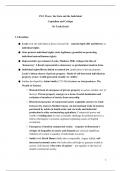PL2: Power, the State and the Individual
Capitalism and Critique
Dr Tarik Kochi
1. Liberalism
● Locke et al, the individual as basis of social life – natural rights (life and liberty) as
individual rights.
● State protects individual rights (state legitimacy grounded on protecting
individual natural/human rights)
● Representative government (Locke, Madison, Mill) reshapes the idea of
‘democracy’. Liberal representative-democracy as predominant modern form.
● Individual rights/liberty linked to natural law justification of private property –
Locke’s labour theory of private property. Model of self-interested individual as
property owner, wealth generated socially via ‘utility’.
● Further developed by Adam Smith (1723-90) (Lectures on Jurisprudence; The
Wealth of Nations).
▪ Historical basis of emergence of private property in society (stadial view of
history). Private property emerges as a form of social domination and
exclusion of members of society from ownership.
▪ Historical emergence of commercial society (capitalist society) via trade
between city-states in Mediterranean, via international trade in luxuries
purchased by nobles in feudal order and via trade and industrial
production in cities restructuring agriculture. Commercial power and
wealth of trading class in cities eventually challenge for political power (i.e.
follows Harrington’s economic argument explaining causes of English
revolution) .
▪ Emergence of modern commercial society – response to Roussseau’s
critique of inequality in society and demand (per classical republican
tradition) of a return to equality of individuals in society.
▪ Smith (with David Hume) thinks this is impossible. Argues selfish, self-
interested economic actor who looks after self helps to generate wealth in
society. Self-interest (‘the order of egoism’ – not equality) is the basis of
modern commercial society.
1
, ▪ Pursuing self-interest leads to utility, to greater productivity via division of
labour.
▪ Reliance upon ‘invisible hand’ of ‘natural’ course of market competition
leads to greater productivity, more efficiency, cheaper consumer goods.
▪ Example of the ‘pin factory’, modern division of labour as the image of a
productive society run via self-interest and the market.
▪ While inequality in market society, end up with better standard of life for
those at the bottom (‘European workers live better than African kings’)
▪ Free market principle should be extended internationally against protectionism
(1st theory of capitalism and globalisation!). Agriculture and industrial
production that is inefficient should be dispensed with. Free trade leads to a
form of mutual advantage between those who exchange out of self-
interest.
▪ But problem of worker trapped in division of labour, a negative social
cost, boring repetitive job, worker becomes ‘corrupted’ mentally and
physically. Smith proposes education programs and physical exercise for
the working poor.
2. Marx’s Critique of Capitalist Society
● Karl Marx (1818-83), German, lived in London, read in the British Library.
▪ Draws upon historical account from Smith and the German philosopher
G.W.F. Hegel. Views human life historically and in terms of wider forms
of power relations and modes of exploitation and forms of freedom that
occur through struggle (inherits much also from Machiavelli here i.e. of
contending forces within the state, where inequalities of wealth generate
social/class conflict).
▪ Against ‘atomistic’ view of humans, sees individuals as forming parts of
groups, classes, has holding shared cultural beliefs (ideology) which shapes
their aspects of their lives and decisions. Therefore, thinks of humans in a
sense similar to Aristotle and Greek republican tradition – of the shared
‘social being’ of the community or polity, whose ideal is a community in
which individuals realise themselves through each other and act in accordance
with a shared idea of human dignity and social justice.
▪ History is often a history of exploitation. Modes of exploitation change and
this change is linked to the form or ‘mode of production’ and organisation of
2





